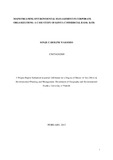| dc.description.abstract | In recent years, the emerging trend for corporates is to be involved in environmental matters. That is both the physical as well as the social aspect. This is viewed as part of best practice. Institutions are also being pushed into this to mitigate their negative impacts to the environment through resource utilization, emissions, waste production and accumulation.
The objectives of this study were: to examine the existing environmental management framework in Kenya Commercial Bank (KCB); to discuss the driving forces of integrating environmental management in KCB.; to discuss the specific environmental practices in place; to assess the level of involvement of KCB’s employees in the implementation and operation of the environmental management system and to investigate the benefits of mainstreaming environmental management in KCB’s operations. The hypotheses of the study were: There is no significant relationship in KCB pro fit levels and staff motivation; and there is no significant difference in cost savings before and after the introduction of environmental conservation initiatives in KCB.
KCB was used as a case study as it is a corporate with branches located in five countries namely Kenya, Tanzania, Uganda, Rwanda and South Sudan. Questionnaires were administered to branches in all the five countries. Branches were sampled using proportionate random sampling whereby the different countries were used as strata; subsequently branches from the strata were picked at random. There were two respondents from each branch. Interviews were also conducted for senior management. Secondary data was obtained from books, journals, financial reports, environmental and social reports as well as the company’s website.
The results indicated that KCB just like many other companies in Africa does not have an environmental management system (EMS) to govern the social and environmental concerns of the organization. It was also found out that the key driving force for corporates to be involved in environmental and social issues is for a good public reputation. The other main driving force is compliance to governing bodies’ for instance National environment management agency (NEMA) and Occupational safety and health agency (OSHA). This still boils down to trying to maintain a good reputation in the public eye. The other notable driving force is for KCB to increase their market opportunities by either: meeting community needs in the quest to alleviate poverty.
Consequently, the government should make it mandatory for all organizations to have departments charged with environmental concerns. On the other hand, it is imperative for companies to have a strong senior management commitment to social and environmental issues as well as adopt an EMS which should be functional, well staffed and fully operational to ensure that environmental concerns are mainstreamed into the daily operations of the company. In addition, training and awareness of environmental issues should be vehemently conducted to the staff and other stakeholders of the company to ensure a general understanding and positive adoption of environmental concerns. | en |

